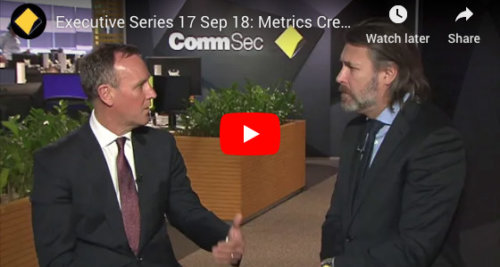The role of sustainability in private markets
Metrics Credit Partners provide some insights into how Metrics factors sustainability into its investment decisions.
More than ever, investors are focusing on sustainability and ESG (environmental, social, governance) factors when considering where to put their money. COVID-19 turned the spotlight on sustainability by emphasising the importance of addressing environmental and social challenges, while international agreements on CO2 emissions and the release of the “Code Red” report from the Inter-Governmental Panel on Climate Change gave added urgency to the challenge of addressing global warming by reducing carbon emissions. The Responsible Investment Association Australia’s (RIAA) Responsible Investment Benchmark Report Australia 2021 highlights the growing pace at which capital is shifting towards funds demonstrating leading responsible investment practices. Australian Responsible Investment assets under management rose by $298 billion to $1,281 billion in 2020. The proportion of Responsible Investment AUM to Total Managed Funds was 40% in 2020, up from 31% in 2019.
Change began with listed equities, where there is a large amount of public data and benchmarks against which companies can be measured. But it is becoming a whole of portfolio issue as investors press to ensure that ESG factors are integrated into all asset classes, including private debt and private equity.
That has posed a challenge to private debt providers because the private nature of the companies means there may not be readily available ESG data in relation to the borrower, let alone benchmarks for similar businesses against which this can be measured.
This has led private debt providers to devote more resources to understanding the ESG performance of borrowers. Fortunately, established due diligence practices are already suited to this and the heightened focus on ESG allows lenders like Metrics to engage even more deeply with borrowers to understand the risk and opportunities. It is the start of a conversation with management about key issues that continues throughout the life of the transaction and allows challenges to be addressed as they arise.
Sustainability is at the heart of the Metrics business, which has a responsibility to act in the best long-term interests of investors in our funds.
The rise of ESG and sustainability concerns presents both risk and opportunity for Metrics. A Deloitte survey in late 2020 found that if climate change goes unchecked, Australia’s economy will be 6% smaller and have 880,000 fewer jobs by 2070. That’s a $3.4 trillion lost opportunity over the next half a century. But there’s a $680 billion dividend that’s ours for the taking if we do rise to this challenge, along with 250,000 more jobs, the study argued. Metrics believes that properly addressing the issues can have a material impact on our portfolios and, ultimately, the returns we provide to our investors.
Metrics’ approach to sustainability is evolving with developments in regulation, climate change and societal expectations. Systems and processes are being upgraded to collect high-quality data that will help measure progress and deliver transparent sustainability reporting for all of our stakeholders. Investors and institutions can expect to see more detailed and better organised information from Metrics about how it and its borrowers are working to toward sustainability goals.
Our refreshed ESG policy reflects Metrics’ support for the Paris Agreement’s goal of limiting global temperature rises to well below 2 degrees Celsius above pre-industrial levels and pursuing efforts to limit the temperature increase to 1.5 degrees Celsius above pre-industrial levels – through its portfolio and its own operations. We are also building a network of collaborations with similarly committed organisations, such as the Climate Bonds Initiative, and working towards implementing the recommendations of the Taskforce on Climate-related Financial Disclosures, including for the firm’s financed emissions.
Metrics’ approach flows from the Board through the whole organisation. The Investment Committee is responsible for ensuring that the investment process reflects the ESG policy and the firm’s commitments under the UN Principles for Responsible Investment. A dedicated Sustainable Finance team supports the Investment Committee in developing and implementing the ESG policy, as well as helping develop and monitor strategies that formally integrate particular ESG factors into the investment process.
Environmental issues have been a major driver of the growing investor tide in favour of ESG because of both the immediacy of the issues that need to be addressed, and the availability of data to measure progress in addressing it. But the COVID-19 pandemic has highlighted social issues that need to be addressed and are increasingly on the radar of investors, including the disproportionate effects of lockdowns on the young and workers whose jobs could not be done from home.
Addressing those concerns is becoming a mainstream project for companies who want to better reflect the wishes of their customers, investors, employees and partners for a fair, equitable and sustainable society.
By articulating and demonstrating our commitment to sustainability we want to show leadership, increase the impact of what we do to address these challenges and provide transparency to our stakeholders.
Other News
Metrics Income Opportunities Trust (ASX: MOT) | Investor Information
Metrics Income Opportunities Trust: income today with upside potential Metrics Credit Partners CEO and Managing Partner Andrew Lockhart recently spoke…
Metrics Master Income Trust (ASX: MXT) | Investor Information
Metrics Master Income Trust (ASX: MXT): disciplined income through diversified corporate lending Metrics Credit Partners CEO and Managing Partner Andrew…
INSIGHTS
MCP Income Opportunities Trust (MOT) lists on ASX
Sydney, 29 April 2019: The Trust Company (RE Services) Limited (ABN 45 003 278 831) (Responsible Entity) is the responsible…
MCP Master Income Trust wins Lonsec Listed Fund Award
The award came a year after MXT was listed on the Australian Securities Exchange





